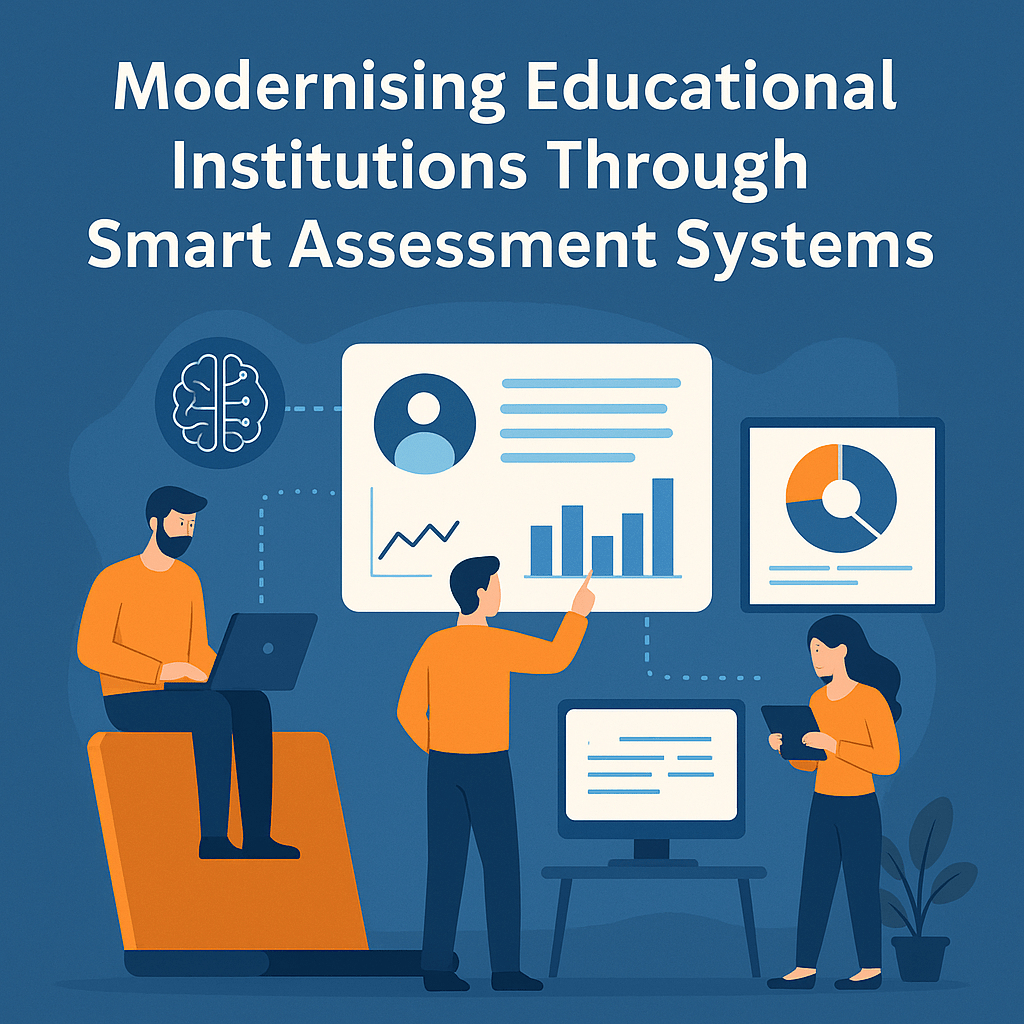Modernising Educational Institutions Through Smart Assessment Systems: A Strategic Upgrade for 21st Century Learning

Smart assessment systems in education are no longer futuristic concepts, they are rapidly becoming the cornerstone of modern educational infrastructure. With growing demand for personalized learning, efficient evaluations, and scalable teaching solutions, educational institutions around the world are turning to AI-powered assessment technologies to modernize their processes.
These systems are transforming how educators design, deliver, and interpret student assessments, shifting from static testing toward dynamic, real-time evaluation models that adapt to individual learner needs.
What Are Smart Assessment Systems?
Smart assessment systems integrate artificial intelligence, machine learning, and data analytics into the evaluation process. Unlike traditional assessments, which rely on manual grading and standard questions, smart systems offer:
- Adaptive question delivery
- Instant scoring
- Personalized feedback
- Competency mapping
- Learning progression dashboards
By leveraging technology, these systems allow institutions to scale quality education without compromising personalization or academic rigor.
Key Features of Smart Assessment Systems
1. AI-Powered Grading
AI tools can automatically grade multiple-choice, short answer, and even open-ended questions using natural language processing (NLP). These systems can identify errors, evaluate structure, and assign rubric-aligned scores in seconds.
2. Real-Time Feedback
Learners receive immediate insights into their performance, including suggestions for improvement. This shortens the feedback loop, allowing for faster iteration and deeper learning.
3. Competency-Based Progress Tracking
Students can view visual dashboards showing mastery of specific learning outcomes or competencies. Educators can pinpoint where each learner excels or needs support.
These features are actively explored in educator development programs like those offered by The Case HQ, where digital transformation in assessment is a key focus area.
Benefits of Smart Assessment Systems for Institutions
| Benefit | Institutional Impact |
|---|---|
| Efficiency | Saves faculty time in grading and admin |
| Scalability | Supports large cohorts without loss of quality |
| Equity | Reduces human bias with rubric-aligned scoring |
| Transparency | Enables data-driven reporting for accreditation |
| Student Engagement | Empowers learners with real-time performance data |
When used effectively, smart systems can elevate the institution’s reputation and academic quality, making them more attractive to digitally native learners.
Case Example: Transforming Assessment at Scale
Imagine a university with 15,000 students implementing smart assessment in first-year business courses:
- All assessments are delivered through a digital platform.
- AI auto-scores assignments and quizzes, flagging inconsistencies.
- Faculty use performance dashboards to identify struggling students.
- Students receive personalized feedback on how to improve.
This model enhances quality, reduces grading time, and improves student satisfaction—all key to modern educational success.
For a real-world implementation guide, educators can refer to resources on the Case HQ Courses Page, which includes training on AI-enhanced evaluation tools.
Implementation Considerations
While promising, modernising education through smart systems requires thoughtful execution:
- Change Management: Teachers and administrators need training and support to transition from manual to digital assessment models.
- Data Privacy: Institutions must implement secure systems that comply with GDPR and other regulations.
- Bias Monitoring: AI systems must be regularly audited to prevent algorithmic bias.
- Human Oversight: While automation helps, teachers should maintain final authority in evaluating student work.
By adopting a blended human-AI approach, institutions can ensure both innovation and integrity.
Future Outlook: Intelligent, Connected Campuses
Smart assessment systems are a gateway to larger digital transformation in education. When integrated with LMS platforms, learning analytics, and adaptive content, they form the foundation of an intelligent campus ecosystem that can:
- Predict academic success
- Personalize curricula
- Automate accreditation reports
- Drive strategic planning with learning data
These systems are not just tools, they’re enablers of smart education policy and learner-first innovation.
Smart assessment systems in education are modernising institutions by enabling real-time feedback, scalable evaluation, and evidence-based instruction. As AI and education technology mature, these systems will be central to how schools, colleges, and universities deliver meaningful learning experiences.
To explore practical training and tools that support smart assessment implementation, visit https://thecasehq.com/ and access cutting-edge resources for forward-thinking educators and institutions.
https://thecasehq.com/modernising-educational-institutions-through-smart-assessment-systems-a-strategic-upgrade-for-21st-century-learning/?fsp_sid=2593
Comments
Post a Comment